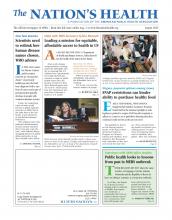Every year you hear the same story in the news: A vacation cruise turns not-so-relaxing after an outbreak of norovirus.
But norovirus, a group of highly contagious viruses that cause diarrhea and vomiting, isn’t just confined to the open seas. You could be one surface or unwashed hand away from an outbreak in your own home.
Norovirus can be spread in many ways, which is why it’s so difficult to control, says Aron Hall, DVM, MSPH, DACVPM, an epidemiologist with the viral gastroenteritis team of the Centers for Disease Control and Prevention’s National Center for Immunization and Respiratory Diseases.
“It can be spread when people get fecal matter on their hands and don’t wash them properly and put their hands near their mouth and make other people sick,” he says. “It can also spread through food and through water. It can also stay on surfaces for long periods of time. If people touch these surfaces or put their hands near them, they can get sick. When people vomit that have norovirus, it can spread through the air and potentially infect other people.”
Young children tend to have the highest rates of norovirus infection, but seniors ages 65 and older are at higher risk of death from severe complications, Hall says. While norovirus can happen at any time, CDC says 80 percent of outbreaks happen between November and April.
“We think a lot of this has to do with human behavior,” Hall says. “People gather more indoors when it’s cold outside and have more opportunities to spread infection. It may also be related to the virus itself. It persists when it’s colder so it can survive on surfaces for longer periods of time.”
Vomiting and diarrhea are the hallmark signs of an infection, but there are other symptoms, such as nausea, stomach pain and body aches, which is why people sometimes call norovirus the stomach flu, Hall says.
If you have the signs and symptoms of norovirus, one of the most important things to do is drink plenty of fluids, as dehydration can be serious, Hall says. You must also take care to not spread the virus to family and friends caring for you.
“We really want to focus on hand hygiene,” Hall says. “If you’re washing your hands very well and removing any fecal matter or vomit that might be on your hands, cleaning entire surfaces and washing off countertops, all of that can go a long way.”
There are steps you can take to prevent an infection such as norovirus from making you sick in the first place, Hall says.
“Certainly, maintaining good hygiene is probably the most important thing you can do to keep yourself safe from norovirus…washing your hands after you use the bathroom, before caring for others, after changing diapers and cleaning up vomiting accidents that may happen,” Hall says.
More ways to stop spread of norovirus
Prevention doesn’t end with hand-washing. When it comes to food preparation, CDC recommends cooking shellfish thoroughly and washing fruits and vegetables before eating. When doing laundry, make sure to wear disposable gloves when handling items that have feces or vomit, and to wash for as long as possible, CDC says. You should also clean surfaces using chlorine bleach solutions to disinfect surfaces where the virus may harbor, according to CDC.
Norovirus in the pool? Yuck! How to stay safe while swimming
Swimmers who like to take a dip in their neighborhood pool or dive into a local watering hole should be alert: norovirus may lurk in the waters.
The risk for an outbreak may be high if the water you swim in isn’t treated with chlorine, CDC says. Whether you’re in a pool or a lake, CDC recommends showering before you swim, avoiding swallowing lake or pool water and staying out of the water altogether if you’ve recently had diarrhea or vomited.
CDC also says parents or guardians should take children out of the water every hour to use the bathroom and change or check diapers in a space far away from swimming water.

Photo by VStock, courtesy of iStockphoto.
For more tips on how you can prevent norovirus, visit www.cdc.gov/norovirus
Download a podcast with Hall on The Nation’s Health podcasts page
- Copyright The Nation’s Health, American Public Health Association









